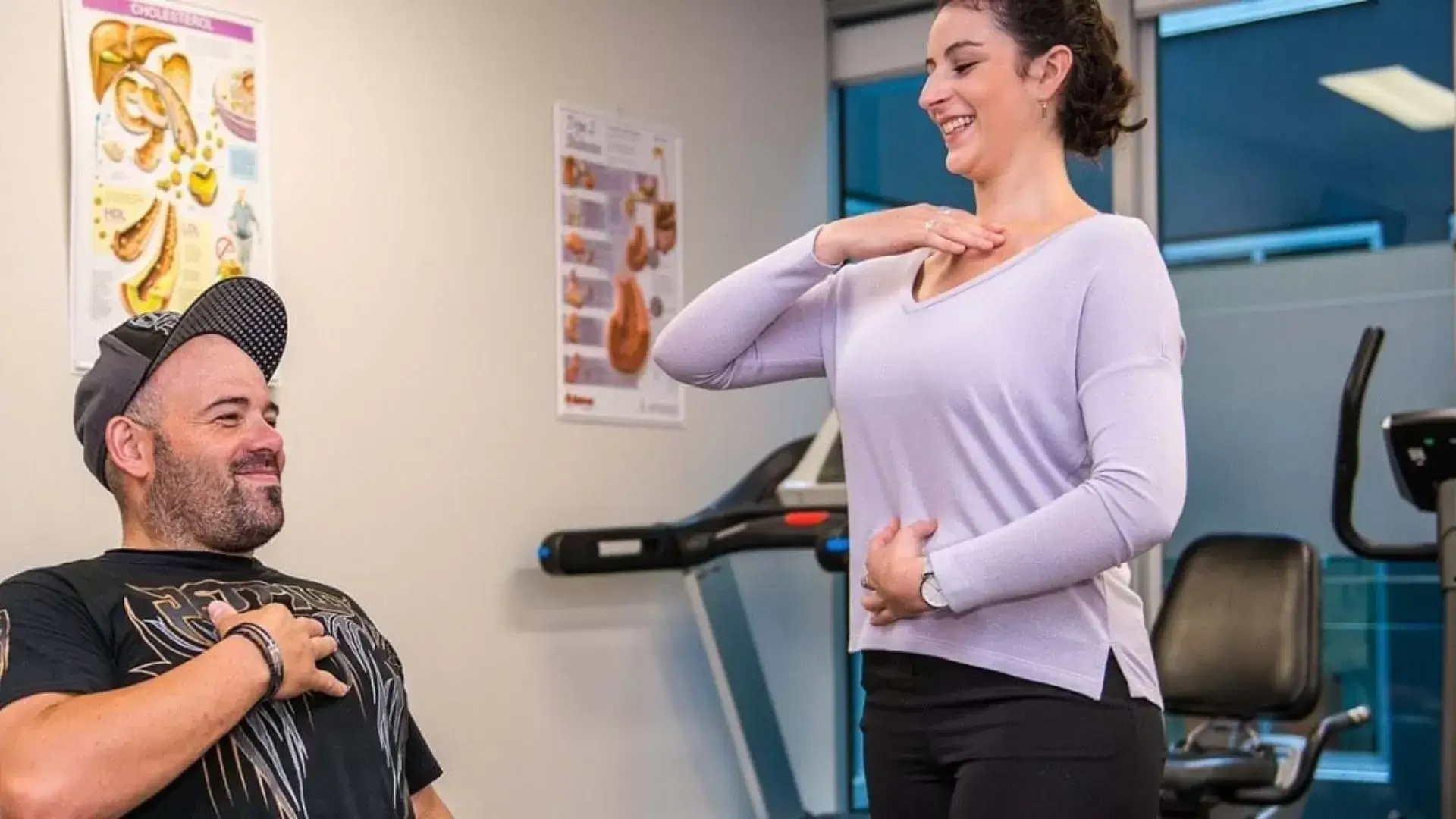In Mississauga, we offer Physiotherapy for Chronic Obstructive Pulmonary Disease (COPD) to help individuals manage their condition and improve their quality of life. Our Specialized Physiotherapy Services in Mississauga focus on creating individualized care plans that enhance lung function and increase physical endurance. We utilize breathing exercises, chest physiotherapy, and structured exercise programs to manage symptoms and promote overall well-being. Education plays an essential role, empowering individuals to understand COPD and engage in effective self-care. Together, we can implement lifestyle changes that greatly improve lung health. Explore the available resources and discover how they can truly support your journey towards better respiratory health.

At Mississauga Physio Chiro Clinic, we offer specialized physiotherapy and chiropractic services designed to enhance respiratory function and overall well-being for individuals living with COPD. Our approach integrates pulmonary rehabilitation, focusing on individualized care plans that address specific needs. Through targeted breathing exercises, we help improve lung capacity and efficiency, which can greatly alleviate exercise intolerance.
We also incorporate airway clearance techniques to assist in clearing mucus from the airways, promoting better breathing. Our team emphasizes self-management strategies, empowering patients with the knowledge and skills to manage their condition effectively. Patient education is a cornerstone of our services, as we believe informed patients can make better decisions regarding their health.
In addition to our physical therapies, we provide dietary support and hydration advice, recognizing their critical roles in optimizing health outcomes. By addressing these aspects alongside physiotherapy and chiropractic care, we aim to enhance the overall quality of life for our patients. Our goal is to create a supportive environment where individuals with COPD can thrive, utilizing evidence-based practices tailored to their unique circumstances. Together, we can work towards better respiratory health and improved daily functioning.
Understanding the causes and risk factors of COPD is essential for effective management and prevention, as it enables us to identify triggers that can exacerbate the condition. Chronic obstructive pulmonary disease, often a smoking-related lung disease, is primarily caused by long-term exposure to harmful substances. Smoking remains the leading risk factor, but we must also consider secondhand smoke, which can greatly impact non-smokers.
Air pollution is another key contributor, as pollutants can cause chronic inflammation in the lungs, leading to dyspnea and lung function decline. Additionally, occupational exposure to harmful dust, chemicals, or fumes can increase our risk of developing COPD, particularly in certain industries.
Genetic factors may also play a role; some individuals are genetically predisposed to lung conditions. Understanding these triggers helps us manage and mitigate the risk of exacerbations, which can severely impact our daily lives. By recognizing and addressing these causes, we can work towards reducing inflammation and preserving lung function, ultimately improving our quality of life in the face of chronic obstructive pulmonary disease.
Recognizing the symptoms of COPD is essential, as they can considerably affect our daily activities and overall quality of life. COPD, which includes chronic bronchitis and emphysema, often presents with several key symptoms. We may experience shortness of breath, making even simple tasks challenging. A chronic cough, often accompanied by sputum production, can disrupt our daily routines and social interactions.
Fatigue is another common symptom, leaving us feeling drained and less motivated to engage in activities we once enjoyed. In some cases, individuals with COPD may also experience weight loss, which can further impact our health and energy levels. It’s vital to understand that these symptoms can lead to respiratory failure if not managed effectively.
Regular pulmonary function tests can help us track the progression of the disease and adjust our treatment plans accordingly. By recognizing and addressing these symptoms early, we can take proactive steps to maintain our quality of life. Awareness not only aids in symptom management but also empowers us to seek help and make informed decisions about our health.
Physiotherapy plays an essential role in alleviating COPD symptoms, as it enables us to enhance our lung function and improve our overall physical endurance. By focusing on techniques that target airflow obstruction, we can better manage our respiratory disease. One effective approach is diaphragmatic breathing, which strengthens our respiratory muscles and promotes more efficient inhalation, complementing the use of bronchodilators and inhalers.
Chest physiotherapy is another valuable technique that helps clear mucus, allowing for easier breathing. Controlled coughing strategies can also aid in the expulsion of secretions, reducing the risk of infections. Additionally, pulmonary exercise training is vital as it helps us build stamina and improve our cardiovascular health, which is often compromised in lung disease.
Energy conservation techniques are equally important; they teach us how to perform daily activities without excessive fatigue. By incorporating these physiotherapeutic approaches, we can greatly relieve symptoms, manage our condition more effectively, and enhance our quality of life. To summarize, physiotherapy is a cornerstone in our journey toward better symptom management in COPD, helping us breathe easier and live more fully.

Pulmonary rehabilitation is a thorough program designed to enhance our lung function and mobility, greatly improving our ability to perform everyday activities. This multi-faceted approach typically includes exercise training, education on managing COPD, and nutritional support. By participating in pulmonary rehabilitation, we can experience significant improvements in our lung function as measured by spirometry, which assesses how well our lungs are performing.
Incorporating early intervention strategies is essential, especially for those who smoke, as smoking cessation is a key component of our recovery. Additionally, medications like corticosteroids and beta-agonists may be prescribed to help manage symptoms and improve our overall lung health. For some of us, supplemental oxygen therapy can provide the necessary support to enhance our oxygen levels during physical activity.
Through structured exercises and education, we can work on improving our mobility and endurance. This not only helps us regain strength but also boosts our confidence in managing daily tasks. Ultimately, pulmonary rehabilitation serves as an important resource for enhancing our quality of life and empowering us to take control of our COPD management.
Learning effective breathing techniques can greatly help us manage our COPD symptoms and improve overall lung function. These techniques can alleviate issues like wheezing and chest tightness, which are common in patients with pulmonary disease. One widely recommended method is pursed-lip breathing, where we inhale through the nose and exhale slowly through pursed lips. This helps to keep our airways open longer, making it easier to breathe out stale air, thereby reducing the risk of hypoxemia and hypercapnia.
In addition, we might consider using a nebulizer to deliver medication directly to our lungs, which can assist in managing respiratory infections and inflammation. It’s essential to practice these techniques regularly, as they can improve our breathing efficiency and decrease the risk of muscle wasting due to inactivity.
In addition to effective breathing techniques, airway clearance and chest physiotherapy play a significant role in enhancing our lung function and overall respiratory health. These methods help us manage mucus production, which can often lead to complications like acute COPD exacerbation. By employing techniques such as postural drainage and percussion, we can facilitate the removal of excess mucus, thereby improving our breathing efficiency.
Chest physiotherapy is especially important for patients at risk of pulmonary hypertension and right heart failure, as it helps reduce the workload on our lungs. In many cases, our healthcare providers may recommend adjunct treatments such as anticholinergics or nicotine replacement therapy to support our overall management plan.
To create an ideal environment for our recovery, we might also consider using air purifiers and humidifiers at home. These devices can help maintain optimal humidity levels and reduce irritants that exacerbate our symptoms. By incorporating airway clearance and chest physiotherapy into our routine, we can take proactive steps towards better respiratory health and improved quality of life.
Exercise programs tailored for COPD can greatly enhance our strength and endurance, ultimately improving our overall quality of life. These programs focus on counteracting the effects of lung damage and skeletal muscle dysfunction, which are common in individuals with COPD. By engaging in regular physical activity, we can combat malnutrition, a prevalent issue in this population, and promote a healthier body composition.
Incorporating resistance training and aerobic exercises into our routine not only builds physical strength but also boosts our endurance, allowing us to perform daily activities with less fatigue. Additionally, we may consider discussing the use of phosphodiesterase inhibitors with our healthcare provider, as these can help improve exercise tolerance by reducing breathlessness.
Participating in structured exercise programs can also be beneficial for those receiving palliative care, providing a sense of control and enhancing emotional well-being. Moreover, it’s essential for us to stay up-to-date with vaccinations, such as the flu vaccine, to minimize respiratory complications that could hinder our exercise efforts. Together, let’s embrace these exercise programs as an important part of our COPD management strategy.

Integrating oxygen therapy with physiotherapy can greatly enhance our ability to engage in physical activities, addressing both respiratory limitations and improving overall functional capacity in individuals living with COPD. By combining these approaches, we can effectively support and optimize respiratory function during exercise training and daily activities.
Oxygen therapy guarantees that we maintain adequate oxygen levels, allowing us to participate more fully in pulmonary rehabilitation programs. It enhances the benefits of breathing techniques we learn in physiotherapy, helping us manage breathlessness and fatigue more effectively. Patient education plays an essential role in this integration, as understanding how to use oxygen therapy during exercise can empower us to take control of our condition.
Moreover, this combined approach has been shown to markedly improve our quality of life. As we become more active, we often see improvements in our physical endurance and emotional well-being. By working closely with our healthcare team, we can tailor our COPD care to include both oxygen therapy and physiotherapy, guaranteeing that we get the most extensive treatment possible for chronic obstructive pulmonary disease. Together, we can pave the way to a healthier, more active lifestyle.
Effective management of COPD flare-ups often involves implementing targeted physiotherapy strategies that can help us regain control over our symptoms and improve our overall respiratory function. During these episodes, we may experience increased shortness of breath, wheezing, and fatigue, which can lead to complications like pneumonia or cor pulmonale. By utilizing physiotherapy techniques, we can enhance our lung function and reduce CO2 retention.
One essential strategy is breathing exercises, which help us improve our lung expansion and reduce the risk of developing a barrel chest. Additionally, we can incorporate techniques to address symptoms such as cyanosis and clubbing, which may arise due to inadequate oxygenation. Regular physiotherapy sessions can also facilitate early intervention for flare-ups, decreasing the need for emergency care.
It’s vital for us to discuss the importance of a pneumonia vaccine with our healthcare providers, as preventing infections can mitigate flare-ups. Through education and personalized physiotherapy plans, we can take proactive steps to manage our COPD effectively, ensuring a better quality of life while minimizing the impact of flare-ups on our daily activities.
In addition to managing flare-ups with targeted physiotherapy strategies, postural adjustments and energy conservation techniques play a key role in enhancing our breathing efficiency and overall comfort while living with COPD. Proper posture can greatly improve lung capacity, allowing us to breathe more deeply and effectively. We should practice sitting upright or standing tall to optimize our airflow, especially during activities that may trigger breathlessness.
Energy conservation techniques are equally essential. By pacing ourselves and planning tasks, we can reduce fatigue and avoid exacerbating our symptoms. For instance, we can organize our day to include rest periods, especially during peak hours for flu complications, which can further stress our respiratory system.
It’s crucial to be mindful of factors such as cigarette smoking and conditions like alpha-1 antitrypsin deficiency, as these can impact our lung function measured by FEV1. We encourage residents of 1834 Lakeshore Rd W #6C, Mississauga, ON L5J 1J7 for personalized strategies that align with our unique needs. Together, we can implement these adjustments to improve our daily lives with COPD.
Nutrition plays an essential role in supporting lung health and managing symptoms for those of us living with COPD. A well-balanced diet can help us maintain ideal body weight, which is significant since both underweight and overweight conditions can worsen our symptoms. We should focus on incorporating nutrient-dense foods, including fruits, vegetables, whole grains, lean proteins, and healthy fats.
Specific nutrients, such as omega-3 fatty acids found in fish and flaxseeds, may help reduce inflammation in our lungs. Additionally, antioxidants from fruits and vegetables can combat oxidative stress, potentially improving lung function. Staying hydrated is also essential, as adequate fluid intake helps thin mucus, making it easier to expel.
It’s important for us to limit processed foods high in sugar and unhealthy fats, as these can contribute to inflammation and overall poor health. Preparing meals at home allows us to control ingredients and portion sizes, promoting healthier eating habits. Consulting with a registered dietitian can provide personalized dietary recommendations tailored to our unique needs, ensuring we support our lung health effectively through nutrition. By making these dietary adjustments, we can take proactive steps in managing our COPD symptoms.
Quitting smoking is one of the most essential steps we can take to manage COPD and improve our overall lung health. Smoking exacerbates our symptoms, reduces lung function, and accelerates disease progression. By eliminating tobacco, we allow our lungs to heal, which can lead to fewer flare-ups and a better quality of life.
In addition to quitting smoking, making specific lifestyle changes can greatly impact our COPD management. Engaging in regular physical activity, tailored to our ability, helps improve our lung capacity and overall fitness. We should focus on incorporating activities like walking, swimming, or even gentle stretching, as these can enhance our breathing and increase stamina.
Proper hydration and a balanced diet rich in antioxidants can also support our respiratory health. It’s essential for us to avoid environments with irritants, such as dust, fumes, or extreme temperatures, as they can trigger symptoms.
Physiotherapy plays an essential role in enhancing the quality of life for COPD patients by focusing on tailored exercise programs that improve lung function and overall physical endurance. These programs are designed to meet each patient’s unique needs, helping us to gradually increase activity levels without causing undue fatigue or breathlessness.
By incorporating breathing techniques, we can teach patients how to manage their symptoms more effectively, allowing them to engage in daily activities with greater ease. Strength training and aerobic exercises are also crucial components, as they help build muscle strength and stamina, which can be particularly beneficial for those with limited mobility.
Moreover, education is a key aspect of our approach. We provide patients with information about their condition and the importance of physical activity, empowering them to take control of their health. This holistic approach not only addresses physical limitations but also fosters emotional well-being, reducing anxiety and depression often associated with chronic illness.
Finding expert physiotherapy care for COPD in Mississauga can greatly enhance our management of the condition and improve overall well-being. Accessing specialized services allows us to receive tailored treatment plans that address our unique challenges and symptoms. Physiotherapists in Mississauga are equipped with the knowledge and skills to help us navigate the complexities of COPD.
Through personalized assessments, our physiotherapists can identify specific areas of weakness and develop targeted exercises to improve our respiratory function and endurance. They can guide us in airway clearance techniques, which can help reduce mucus buildup and enhance our ability to breathe more easily.
Moreover, engaging in supervised exercise programs can considerably boost our physical activity levels, leading to better management of COPD symptoms. Our physiotherapists also provide education on breathing strategies and lifestyle modifications, empowering us to make informed decisions about our health. Contact us today!
Mississauga, a vibrant city located in Ontario, offers a diverse community and a range of resources that can support our health journey, including access to specialized healthcare services like physiotherapy for COPD. With a population of over 700,000, we benefit from a network of healthcare providers skilled in managing chronic conditions.
The city’s commitment to health is reflected in its numerous clinics and rehabilitation centers dedicated to respiratory health. These facilities often collaborate with local hospitals and specialists to create a thorough care model. This collaboration guarantees that we receive personalized treatment plans tailored to our specific needs.
Moreover, Mississauga’s accessibility to recreational spaces encourages us to engage in physical activity, which is essential for managing COPD. Community programs focusing on respiratory health often incorporate education on proper exercise techniques and breathing strategies, enhancing our overall well-being.
In Mississauga, we’re fortunate to have access to resources that promote better health outcomes. By leveraging these services, we can effectively manage our COPD and improve our quality of life, making our journey toward better respiratory health more attainable.

Physiotherapy can markedly enhance our overall health by improving lung function, increasing exercise tolerance, and reducing breathlessness. Through tailored exercises and breathing techniques, we can strengthen our respiratory muscles and promote better oxygenation. Additionally, physiotherapy helps us develop effective coping strategies for managing symptoms, ultimately leading to greater independence and improved quality of life. By engaging in a structured program, we can achieve our health goals and feel more empowered in our daily activities.
When considering physiotherapy for COPD, we should look for a physiotherapist with specialized training in respiratory care. They should possess a relevant degree, ideally with post-graduate qualifications in pulmonary rehabilitation. It’s important they have experience in treating COPD patients, as well as knowledge of the latest evidence-based practices. We can also benefit from a therapist who’s registered with a professional body, ensuring adherence to high standards of patient care and ethics.
When considering physiotherapy for COPD patients, we must be aware of potential risks. These can include exacerbation of symptoms, fatigue, or shortness of breath during sessions. However, with proper assessment and tailored treatment plans, we’re able to minimize these risks. It’s essential for us to communicate openly with our physiotherapist about our symptoms and concerns, ensuring that our therapy remains safe and effective for our individual needs.
When it comes to how often we should attend physiotherapy sessions for COPD, it generally depends on our individual needs and treatment goals. Typically, we might start with sessions one to three times a week. Our healthcare provider will assess our progress and adjust the frequency as necessary. Regular attendance can enhance our lung function, improve our overall health, and help manage symptoms more effectively, so staying consistent is essential for our recovery.
Yes, physiotherapy can greatly help with COPD-related anxiety and depression. It offers us techniques to manage breathlessness, which can reduce feelings of panic and distress. Additionally, engaging in physical activity under the guidance of a physiotherapist encourages the release of endorphins, improving our mood. Moreover, the supportive environment created during sessions fosters social interaction, helping us combat feelings of isolation and enhancing our overall emotional well-being.
Reach out to us today to book an appointment or learn more about our services. Our friendly team is here to answer your questions and help you take the first step toward improved health and wellness.
(647) 372-1209

At our Mississauga Physio Chiro Clinic, we are dedicated to providing personalized care that addresses the root cause of your discomfort. With a team of experienced physiotherapists and chiropractors, we focus on restoring your mobility, relieving pain, and enhancing your overall well-being.